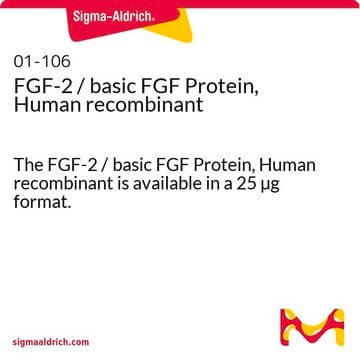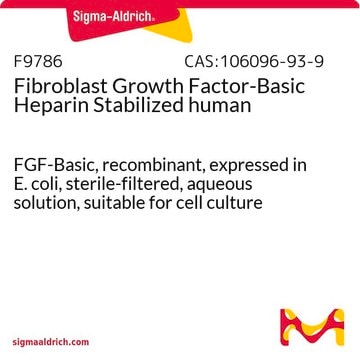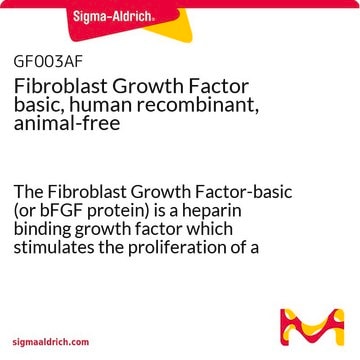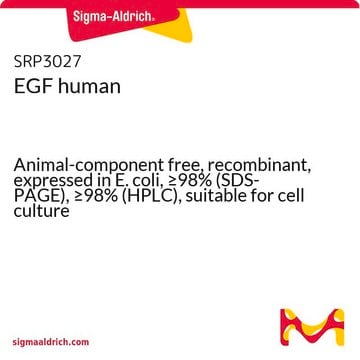SRP3043
FGF-basic human
Animal-component free, recombinant, expressed in E. coli, ≥95% (SDS-PAGE), ≥95% (HPLC), suitable for cell culture
Synonyme(s) :
Catabolin, Endogenous Pyrogen (EP), Leukocyte Endogenous Mediator (LEM), Lymphocyte-activating factor (LAF), Mononuclear Cell Factor (MCF)
About This Item
Produits recommandés
Source biologique
human
Produit recombinant
expressed in E. coli
Pureté
≥95% (HPLC)
≥95% (SDS-PAGE)
Forme
lyophilized
Puissance
≥1x10^7 units/mg
Poids mol.
17.2 kDa
Conditionnement
pkg of 50 μg
Technique(s)
cell culture | mammalian: suitable
Impuretés
<0.1 EU/μg endotoxin, tested
Couleur
white to off-white
Numéro d'accès UniProt
Conditions d'expédition
wet ice
Température de stockage
−20°C
Informations sur le gène
human ... FGF2(2247)
Description générale
Application
Actions biochimiques/physiologiques
Séquence
Forme physique
Reconstitution
Code de la classe de stockage
11 - Combustible Solids
Classe de danger pour l'eau (WGK)
WGK 3
Point d'éclair (°F)
Not applicable
Point d'éclair (°C)
Not applicable
Certificats d'analyse (COA)
Recherchez un Certificats d'analyse (COA) en saisissant le numéro de lot du produit. Les numéros de lot figurent sur l'étiquette du produit après les mots "Lot" ou "Batch".
Déjà en possession de ce produit ?
Retrouvez la documentation relative aux produits que vous avez récemment achetés dans la Bibliothèque de documents.
Les clients ont également consulté
Articles
Discover answers to your frequently asked questions about animal component-free, xenobiotic-free, and chemically defined media and reagents for cell culture.
Discover answers to your frequently asked questions about animal component-free, xenobiotic-free, and chemically defined media and reagents for cell culture.
Discover answers to your frequently asked questions about animal component-free, xenobiotic-free, and chemically defined media and reagents for cell culture.
Discover answers to your frequently asked questions about animal component-free, xenobiotic-free, and chemically defined media and reagents for cell culture.
Notre équipe de scientifiques dispose d'une expérience dans tous les secteurs de la recherche, notamment en sciences de la vie, science des matériaux, synthèse chimique, chromatographie, analyse et dans de nombreux autres domaines..
Contacter notre Service technique







